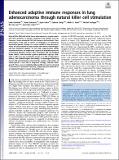Enhanced adaptive immune responses in lung adenocarcinoma through natural killer cell stimulation
Author(s)
Schmidt, Leah Marie; Eskiocak, Banu; Kohn, Ryan; Dang, Celeste; Joshi, Nikhil; DuPage, Michel J.; Lee, Da-Yae; Jacks, Tyler E; ... Show more Show less
DownloadPublished version (2.030Mb)
Terms of use
Metadata
Show full item recordAbstract
Natural killer (NK) cells inhibit tumor development in mouse models and their presence in tumors correlates with patient survival. However, tumor-associated NK cells become dysfunctional; thus, stimulation of NK cells in cancer is emerging as an attractive immunotherapeutic strategy. In a mouse model of lung adenocarcinoma, NK cells localized to tumor stroma with immature phenotypes and low functional capacity. To test their responsiveness within established disease,we engineered a system for inducible expression of activating ligands in tumors. After stimulation, NK cells localized inside tumors, with increased cytokine production capacity. Strikingly, T cells were also recruited to tumors in an NK cell-dependent manner, and exhibited higher functionality. In neoantigen-expressing tumors, NK cell stimulation enhanced the number and function of tumor-specific T cells and, in long-term settings, reduced tumor growth. Thus, even in established disease NK cells can be activated to contribute to antitumor immunity, supporting their potential as an important target in cancer immunotherapy.
Date issued
2019-08Department
Massachusetts Institute of Technology. Department of Biology; Koch Institute for Integrative Cancer Research at MITJournal
Proceedings of the National Academy of Sciences
Publisher
National Academy of Sciences
Citation
Schmidt, Leah et al. "Enhanced adaptive immune responses in lung adenocarcinoma through natural killer cell stimulation." Proceedings of the National Academy of Sciences 116, 35 (August 2019): 17460-17469 © 2019 National Academy of Sciences
Version: Final published version
ISSN
0027-8424
1091-6490